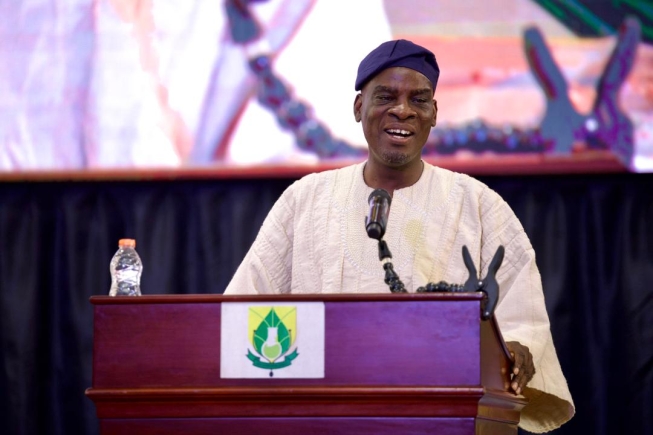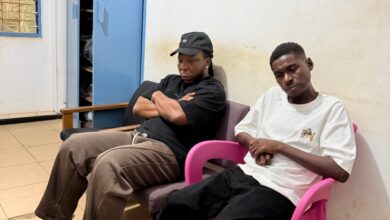SHS Hair Cut Backlash, Could Hon. Haruna Iddrisu Allow Sleeping Dogs have a Peaceful Rest?

By Abdul-Shakuru Zakaria, Public Relations Practitioner.
The discourse on the propriety of Senior High School (SHS) students’ hair grooming regulations, as prescribed in Article 2(13) of the Ghana Education Service (GES) Code of Conduct for Pre-Tertiary School students, has generated enormous traction in public spaces. This discussion follows the strict directives from the Minister of Education, Hon. Haruna Iddrisu, urging school authorities to ensure full compliance.
In two separate public fora, the Minister emphatically reaffirmed his Ministry’s commitment to supporting school authorities in implementing the guidelines. He referenced a viral video of a student from Yaa Asantewaa SHS in tears while her hair was trimmed down to conform to the GES requirement.
Ministry of Education and GES Code of Conduct
What is significant for everyone in this debate is to determine whether Hon. Haruna Iddrisu, who also serves as the Member of Parliament for the Tamale South Constituency, acted whimsically, capriciously, or unlawfully. The answer is certainly a big NO. The Minister was simply enforcing over several decades statute with consistent amendments to meet the current curricular needs of Ghana’s Pre-tertiary education.
For the avoidance of doubt, the said Article 2(13) of the Code of Conduct focuses on Improper Dressing, which states:
- a. Students must dress neatly and wear prescribed attire and footwear always.
- b. No alterations to school uniforms or dresses shall be allowed.
- c. i. Unprescribed attire found in a student’s possession is an offence.Â
ii. Using unprescribed attire by a student is an offence.
- d. Students should have a decent haircut as prescribed by school authorities. Hair should be clean, neat, modest, and avoid extremes in styles and colours.
- e. Men’s hair should be neatly trimmed and the beard clean-shaven.
- f. Students shall not wear chains, bangles, caps, or braces. Wearing spectacles shall be with medical prescription.
- g. Bleaching of the skin by a student shall not be allowed.
High Court Ruling
The High Court, Human Rights Division in Accra, in May 2021, ordered the School Authorities of Achimota Senior High School to admit two Rastafarian students, Tyrone Iras Marhguy and Oheneba Nkrabea. They had previously been denied admission on the grounds of wearing dreadlocks, which the school claimed was contrary to regulation 2(13d-e) of the GES Code of Conduct for pre-tertiary students.
The court held that the school authorities’ actions were an abuse of the students’ fundamental human rights. Secondly, the court ruled that the school regulations or rules were unconstitutional. The court further held that the argument presented by both the Attorney General and the school authorities had no compelling justification. Let me be quick to admit and associate with the court that no actions of the school should be seen to manifestly impede the religious practices of every Ghanaian on the altar of acquiring educational knowledge.
Counterproductive Ruling of the High Court
As an individual, I respect the court’s decision, but I disagree with the ruling. The reason is that if we subject every code of ethics, regulation, guideline, and code of conduct of various professional bodies, groups, and communities to the direction of the court, then Ghana would grind to a halt. We are often guided by customs and tradition. I have always maintained that any society or group without leadership and laws to regulate and guide their conduct is as good as a jungle.
I will attempt to demonstrate the significance of such guidelines, rules, and regulations and how they have tremendously shaped many professions, tribes, cultures, communities, and sporting disciplines.
For instance, practitioners of our noble legal profession are compelled to wear wigs and robes in the discharge of justice. Such a guideline, in my view, is as much a violation of the fundamental human rights of lawyers and judges. The same can be mentioned of Laboratory scientists who are required to wear lab coats during service delivery. Our surgeons, doctors, and nurses are equally not spared the rigmarole of wearing hair scarfs, scrubs, and other personal protective gears.
The world Football governing body, FIFA, recognizing that it is forbidden in most Islamic countries for female footballers to expose their hair in the public domain, subsequently approved the wearing of a head scarf on the pitch for female footballers.
Expanding the frontiers of the court’s argument and others with like minds, it suggests to me that our customs, tradition, and some sporting activities would be seriously threatened. Considering Ghana’s diverse tradition, cultures, and customs, the costumes worn usually include kente, Adinkra cloth, Batakari, smock, warrior dress, and wrapped cloths with beads in the performance of traditional dance. The dress code symbolizes and mirrors the people. In light of this, it would be inappropriate for such costumes to be used as the prescribed dress code for athletes in swimming, sprinting, and other sporting disciplines. It would appear funny. Let anyone attempt wearing Kente or smock to swim or run. It simply wouldn’t work, and this clearly exemplifies our societal and professional dynamism or diversity.
Indeed, nowhere has the Minister associated the wearing of long hair with the cognitive ability of students; he stressed importantly about molding the behavior of the students. In fact, for the third time, also at the commissioning of a TVET project in Salaga, Minister Haruna Iddrisu, with strong conviction, reiterated his position.
“I have come under heavy criticism as a Minister for Education. For those who want to have their own new definition of discipline, let me remind them that discipline begins with the way you dress and the way you appear. This is real discipline, properly defined in good literature: is the way you appear and dress, your appearance. So that is very significant for our country.”Â
This simply tells us that Ministry and its regulatory agencies has considered our cultural heritage and societal values, which are so properly defined. In religious and faith-based SHS schools, the wearing of a head scarf by female and a hat by male counterparts is sanctioned. So, it is certainly repugnant to think GES/NaSIA are against every hairstyle but that which conforms to the Ghanaian family and religious values.
Private School and GES Enforcement
The argument of why Article 2(13) of the guidelines is not implemented in private SHS, where students even excel compared to public school students, has a simple answer: lack of enforcement by National Schools Inspectorate Authority (NaSIA). NaSIA is an agency under the Ministry of Education, established by the Education Regulatory Bodies Act, 2020 (ACT 1023) and clothed with the primary responsibility of evaluating and enforcing quality standards such as school performance, compliance, and investigations in all pre-tertiary schools in Ghana.
In the same vein, private schools  drives the mandate from NaSIA  as such shouldn’t be left off the hook in enforcement of artice 2(13). The letter and spirit of the GES guidelines target not only public schools but all schools licensed in Ghana to operate as Pre-tertiary facilities. So why this selective amnesia?. With strong and effective collaboration between NaSIA and GES, addressing the enforcement gap would be bridged and complied by both Private and Public pre-tertiary school level.
Name Calling and Character Assassination
Since the Minister’s comments, some opponents have veered into ad-hominem attacks, name-calling, and character assassination rather than discussing the issues. Those unprintable words should be condemned and called out. We agree to disagree, but dabbling in such unnecessary and unwarranted attacks should not be countenanced in our quest to dissent.
Among such persons is the former Member of Parliament for Kumbungu Constituency, Hon. Ras Mubarak. His opposition to the Minister’s directive is hypocritical. If wearing dreadlocks were acceptable in Parliament, why didn’t he keep the locks on when he took the decision to join the legislative arm of government? That mantra and narrative of discrimination against him as a Rastafarian should have been forcefully echoed and, even better, made a statement at plenary as the people’s representative. The Parliamentary Service Board takes a serious view on the appropriate dress code for all Members of Parliament, staff, and the general public accessing the premises, especially the public gallery and plenary.
I doff my hat to the Right Hon. Speaker of Parliament, Hon. Alban Kingsford Sumana Bagbin, for the bold initiative in changing the dress code for Speakers of Parliament, where speakers were obliged to wear the robe during plenary.
High Maintenance Cost
As a nation, we have embraced the Free SHS policy meant to reduce the financial burden on parents and guardians. Why, then, do we want to approbate and reprobate our financial muscles?Â
A young level two hundred University lady, Fatima Lamihi Issahaku, joining the discourse succinctly posited:
“Many Ghanaian parents live hand to mouth. Back in SHS, some of my colleagues could go three or four months without receiving any money from home and the food they serve at the dining hall is something you won’t even feed to your dogs or cats at home. Even buying sanitary pads, something that should be free, was a challenge for many girls. Maintaining hair, especially natural hair, is expensive. In Accra, it can cost between 50 and 100 cedis every few weeks just to braid or relax it. You have to redo it every three to four weeks to keep it neat.”Â
So why would anyone want to unleash this avoidable load on parents and guardians? Yes, for wealthy parents, affordability is a non-issue. Any review or amendment of the GES code of conduct in the approval of wearing long and natural hair means we are inviting our poor and innocent young ladies to resort to every financial vehicle, including dubious means, to maintain their hair.
Until otherwise scrapped or amended, the code of conduct must be complied with. Suffice to say, the Minister didn’t act ultra-vires; he wouldn’t be the person to compromise the guidelines. He has no luxury of allowing sleeping dogs to have a peaceful rest.





